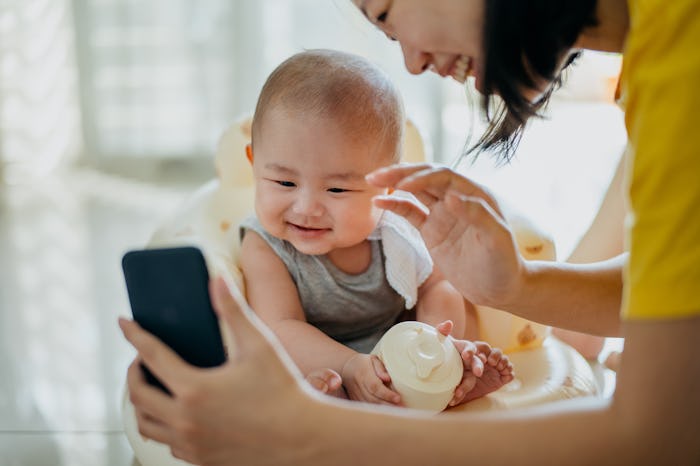Baby

Here's When You Can Expect Your Baby's First *Real* Smile
It’s the sweetest milestone ever.
Truth be told, you could spend all day looking lovingly at your newborn. You cradle that little crop of hair atop their cute little head and bury your nose into their neck and marvel at how utterly amazing that fresh-out-of-the-oven baby scent actually is. One day when you’re gazing at your gorgeous babe, though, you notice that it seems to be a mutual lovefest, because you could swear that your sweetie is smiling right back at you. But when do babies smile? Is it giddiness — or just gas?
“There are so many milestones in the first year of life,” Dr. Alison Mitzner, MD, a board-certified pediatrician and author of Calm and Confident Parenting tells Romper. “In the first few months, your baby will start recognizing your face and voice, and the first thing you may notice is a smile.” But is it a real smile? As it turns out, it really depends on when your baby is flashing all that gummy goodness at you.
When Do Babies Start To Smile?
You might notice that your sleeping sweetie sometimes spontaneously smiles, or (aww) even laughs in their sleep. But if they’re just a couple of weeks old, it’s probably not a real smile, Dr. Arunima Agarwal, M.D., a board-certified general pediatrician in New York tells Romper. “Your baby develops a social smile around 2 months-old,” explains Dr. Agarwal. So what about all those little mini smiles prior to that? Your baby is brilliant, after all, and it must be a real smile, right? Sadly, those smiles aren’t real ones. “Prior to that age, a smile is likely a reflex,” says Dr. Agarwal.
Why Do Babies Smile Around 2 Months Old?
There is so much development happening in those first few days and weeks after Baby’s birth. But even if your baby intensely stares at you, it’s unlikely that they can even make out your facial features well. It’s around eight weeks of age that babies can focus their eyes on your face or other people near them, the American Optometric Association reported. Once they hit that 8-week mark, though, you can expect some real smiles. “At this age, you’ll see a social smile,” says Dr. Mitzner. “They are actually now showing a response to you when they see your face — it is no longer just gas!”
Here’s How To Make Baby Smile
Just because your baby can sincerely smile around 8 weeks-old doesn’t mean that they don’t need a little encouragement. Although your baby can do it all on their own, interacting with your baby can inspire many more sincere smiles, a PubMed study found. While newborn smiling doesn't have an emotional connection, social smiling occurs when you engage with your baby. Simply put, snuggling with your little sweetie, smiling and talking to them will cue cooing (and yes, smiling) from your kiddo.
When Should You Be Concerned If Your Baby Isn’t Smiling?
Although your baby should start smiling around the 2-month mark, you might find that they’re not smiling or that it’s inconsistent. If that’s the case, that’s when you should bring this up with your pediatrician. “If your baby does not seem to smile at you and the main caregivers by 2-3 months-old, talk to your pediatrician,” advises Dr. Agarwal. “The 2-month doctor’s visit is a standard well baby check where your doctor will ask about this, and other milestones.” That way, your baby can be evaluated to ensure that they’re where they should be developmentally.
Of all the milestones your baby will reach, smiling is one of the firsts — and probably the sweetest. Giving your baby lots of one-on-one time where you speak and smile directly at them will help you both to not only bond, but bring on those baby smiles that will absolutely make you melt.
Study cited:
Messinger, D., Fogel, A. “The interactive development of social smiling” 2007.
Experts:
Dr. Arunima Agarwal, MD, a board certified general pediatrician in New York
Dr. Alison Mitzner, MD, a board-certified pediatrician and author of Calm and Confident Parenting
This article was originally published on